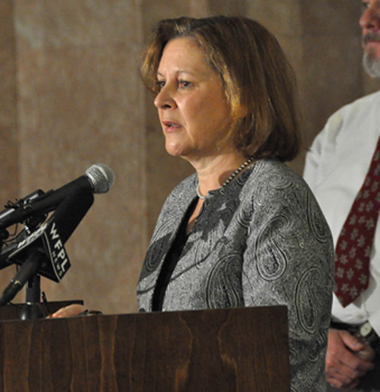Same-sex parental rights at issue before Kentucky high court

Frankfort, Ky. (AP) — As Kentucky's Supreme Court heard a case Thursday that could help determine the parental rights of same-sex partners, one justice noted they were in "uncharted waters."
The court has been asked whether a woman has the right to intervene in an adoption case involving the child of her former same-sex partner.
The two women, identified only by their initials in court documents, were in a same-sex relationship for five years. One of them had a child in 2006 with the help of a sperm donor. The other helped raise the child until the couple split up in 2011.
Now the biological mother has cut off all contact with her ex-partner and has married a man who is trying to adopt the child. The ex-partner, identified as A.H., is seeking joint custody and wants to intervene in the case to block the adoption. But the biological mother, identified as M.L. says because her ex-partner is not the biological mother of the child, she has no parental rights. The biological mother compared her ex to a "baby sitter."
A Kenton County family court ruled in favor of A.H. But a state appeals court reversed the decision, arguing A.H. lacked legal standing to intervene in the adoption.
The case is one of several across the country that could help sort out the parental rights of same-sex couples, who earlier this year won the right to marry in all 50 states following a decision by the U.S. Supreme Court.
In Maryland, a state appeals court ruled a non-biological mother "could not prevail over the objection to custody and visitation by the biological mother." Other states, like Maine, have passed laws to recognize "de facto parents" who meet certain requirements, including accepting full and permanent responsibilities for the child without getting paid for it.
The Kentucky Supreme Court has already ruled that same-sex partners may seek custody of a non-biological child. But in that case, decided in 2010, the women involved had a contract written by a lawyer and signed by both of them. No such agreement exists in this case.
"We are ... still in unchartered waters with some of these issues," said Justice Lisabeth Hughes Abramson.
Lawyers for A.H. say that by raising her daughter with A.H. and giving the child A.H.'s middle and last name, the biological mother effectively waived her exclusive parental rights.
"It seems like a bit of a stretch to say there is automatically a superior custody right here," Justice Michelle M. Keller said to Amy Anderson, M.L.'s attorney. "No doubt that 20 years ago I think I could agree with you the courts tended to agree the biological mother (has an) inherent superior custody right. But now we have families that are created all sorts of ways. Was there no family unit here for five years?"
Anderson said "at the time they considered this a family." But she added that the couple had plenty of time after the child was conceived and born to get a court order formalizing A.H.'s parental rights. She said the fact that they did not do that proves M.L. never gave up her exclusive parental rights. Anderson also argued a man in a heterosexual relationship where a child was born with the help of a sperm donor would also not have parental rights.
"There is no order, no anything other than 'I say so' by the non-biological parent that this is what had happened," Justice Mary C. Noble said. "If you are going to do this type of arrangement, go get your court order saying that you are a parent. That didn't happen here."
The justices will decide the case at a later date.
By Adam Beam, Associated Press. Copyright 2015 The Associated Press. All rights reserved. This material may not be published, broadcast, rewritten or redistributed.
The Gayly – December 11, 2015 @ 8 a.m.





